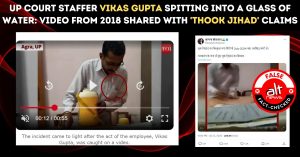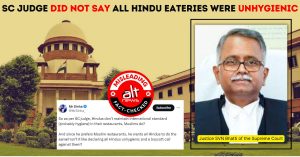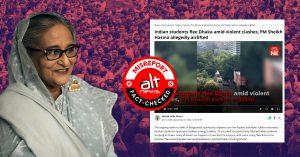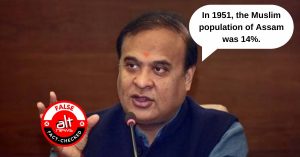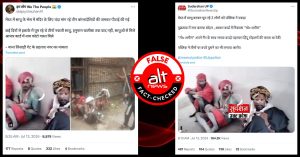Almost a week since former Jammu & Kashmir governor Satyapal Malik’s explosive interview with senior journalist Karan Thapar for The Wire, no mainstream TV news channel has yet managed to host a debate on the charges brought by Malik against the Modi government in connection with the Pulwama attack.
In the interview aired on April 14, Malik said that Prime Minister Narendra Modi and national security advisor (NSA) Ajit Doval had asked him to remain silent when, after the Pulwama attack in February 2019, he had pointed out significant failures on the part of the government agencies which resulted in the death of 40 Central Reserve Police Force (CRPF) men.
Malik, the last governor of J&K before it was divided into union territories, was quizzed by Thapar on several issues, including the dissolution of the J&K assembly in 2018, the Pulwama attack, the abrogation of Article 370, the BBC documentary, the PM’s handling of corruption, etc.
At 13.01 minutes into the interview, the interviewer asked how thousands of CRPF jawans could be allowed to travel by road in a huge convoy (78 vehicles) and thereby become sitting targets. In his detailed response and in reply to subsequent questions on the same topic, Malik made three points that should be considered immensely significant from the perspective of national security. These can be summarized as follows:
A. The CRPF had asked for five aircraft for ferrying the soldiers. This was refused by the home ministry, then under Rajnath Singh.
B. When Malik told PM Modi and NSA Doval that the attack was possible because of ‘our fault’, and could be avoided if the aircraft were given, both the PM and the NSA asked him to keep quiet. (PM said, “Tum abhi chup raho”).
C. The source of the explosive was Pakistan, but it was a massive failure of the administration and the country’s intelligence setup that a car laden with a huge amount of explosives roaming in the streets of Kashmir for 10-12 days could not be located.
Whether they are true or false, credible or absurd, the claims made by Malik, who was the constitutional head of the state when the attack took place and governor of four states in total between 2017 and 2022, are undeniably significant from the perspective of national security.
His exact words can be read in the slides below:
The readers should note that on April 8, that is a week before the Karan Thapar interview, Malik appeared in an interview with broadcast journalist Prashant Tandon where he made similar allegations.
The Pulwama attack comes up 9-minute mark onward in the discussion. Malik says a request for aircraft was made to the defence minister, but it was rejected. He also says that 8-10 link roads in Pulwama were unmanned on the day of the attack and the route of the convoy was not ‘locked’. When Tandon asks how these could happen, Malik replies in one word: “Laparwahi; incompetence”. He also talks about his telephonic conversation with PM Modi on the same day, but does not mention that PM asked him to keep quiet.
A No-show on Prime-time Debates
Defence, terrorism in Kashmir and national security are, in general, among favourite topics for the television debates that are hosted by mainstream news channels every night at prime time. Retired military officers and self-proclaimed defence experts regularly participate in these shows. Regular among them are Major General (retired) GD Bakshi who served in Kashmir for several years and is a Kargil War veteran, Major (retired) Gaurav Arya, Colonel (retired) RSN Singh et al. Not a single mainstream channel, however, did a debate on Satyapal Malik’s accusations of intelligence failure in the context of one of the deadliest terror attacks on Indian soil.
Channels like Times Now & Republic did not mention the revelations by Malik at all. This is particularly bewildering since both the channels have done innumerable stories and debates on the Pulwama attack, its victims and perpetrators. The above-mentioned defence experts are most frequently seen as panelists on these two channels’ prime-time debates on national security.
A keyword search on their YouTube channels (Republic, Times Now) reveals hundreds of such debates and bulletins.
A search on Twitter using time filter reveals that on April 14, Times Now’s prime-time debates/shows hosted by its political editor Navika Kumar and executive editor Rahul Shivshankar focused on Amit Shah’s speech in Bengal where he predicted the fall of the Mamata government, CBI summons to Arvind Kejriwal and gangster Atiq Ahmed. (Screenshots below)
On the same day, the Republic’s prime-time debate hosted by its editor-in-chief Arnab Goswami looked at probes into the BBC in India, the alleged liquor scam in Delhi and gangster Atiq Ahmed.
Navbharat Times, the Hindi news channel from the Times Group, covered the Congress press conference on Malik’s Pulwama revelations.
A Few Media Houses Touched upon Malik’s Revelations
Though no mainstream news channel hosted a debate on Malik’s claims of rejection of aircraft to the CRPF, intelligence failure and the PM’s subsequent instruction to him to stay quiet after the Pulwama attack, several outlets ran short bulletins on the interview and covered political reactions.
India Today did a 1.08-minute bulletin on the reactions from the Congress and the BJP to Malik’s comments.
Aaj Tak anchor Subhankar Mishra presented a 3.32-minute bulletin. He mentioned that Malik had brought serious allegations against the Modi government. His points regarding the refusal of aircraft and the PM’s advice to him to be silent for the time being were presented verbatim. The bulletin also covered Congress and BJP’s reactions to Malik’s revelations.
News Tak did a 3.52-minute show. It touched upon many of the points made by Malik in the interview, other than the Pulwama attack. His exact words were quoted by the presenter and shown on screen, including the phrase allegedly used by the PM: “Tum abhi chup raho”.
Jan Satta, the Hindi newspaper from the Indian Express Group, uploaded a 2.47-minute video report on its website.
Amar Ujala uploaded a 3.24-minute video report on its YouTube channel. It quoted Malik’s comments on Pulawama and PM Modi verbatim. It also included political reactions.
Mirror Now, a channel owned by the Times Group, did a 2.28-minute bulletin on Malik’s accusations. They also Congress’s press conference on the subject.
Zee Salaam, ABP Marathi and Live Hindustan also covered Malik’s comments and political reactions.
Among the English print media, The Telegraph and The Indian Express covered Malik’s interview in a prominent way. On April 15, it was the Page 1 Lead on The Telegraph. On the following day too, their Page 1 Lead was a related story. While the former summarized Malik’s remarks on Pulwama, the latter raised questions about the PMO’s silence on the grave accusations.
The Indian Express Kolkata edition carried the story just below the Page 1 Lead on April 16. The headline highlighted PM’s alleged advice to Malik: “Chup Raho”. The paper carried two related reports on Page 4 on the same day.
One of them, headlined ‘Pulwama attack: CRPF probe had flagged intel failure, convoy length‘, pointed out that an internal inquiry by the CRPF had “largely flagged intelligence failure and excessive length of the convoy as the major reasons for the attack. According to sources, the CRPF inquiry had found that while there had been many inputs about IED attacks, nothing specific was shared about the convoy. It also flagged the convoy’s length as one of the weaknesses in the security preparedness for the movement of forces. The government sanctioned air travel for all soldiers posted in J&K following the attack.”
The Hindu‘s Kolkata edition carried a front-page story on April 15 on the Opposition targeting PM Modi over Malik’s remarks.
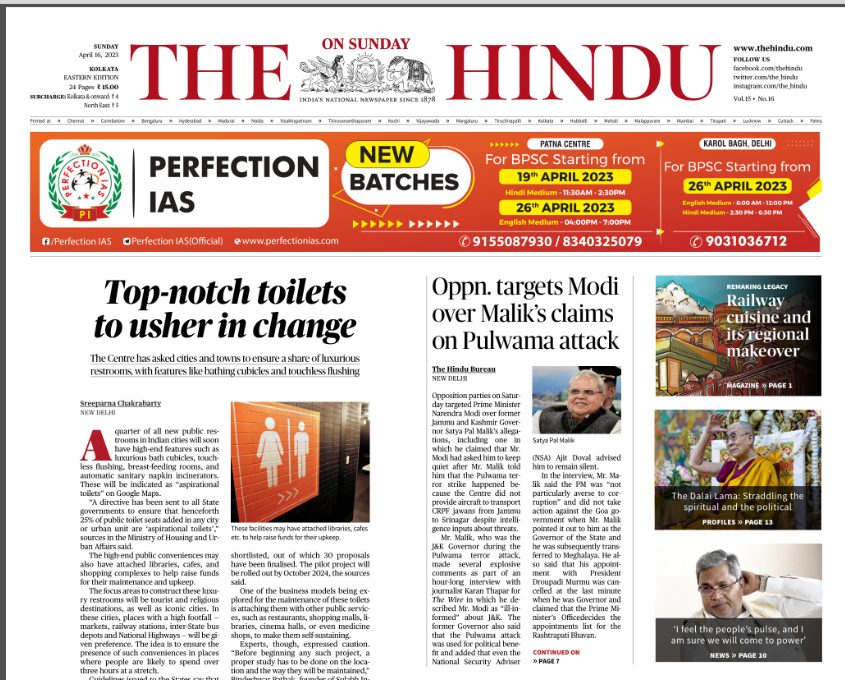
‘Defence Journalists’ Take to Twitter to Downplay Malik’s Revelations
On April 15, that is a day after the interview was aired, senior executive editor of India Today Shiv Aroor, who often covers matters related to defence, took to Twitter to take a jibe at those who took Malik’s words seriously.
The same idiots that rallied around Yashwant Sinha are rallying around Satyapal Malik 🥳
— Shiv Aroor (@ShivAroor) April 15, 2023
Aditya Raj Kaul, an executive editor at TV9 network who lists ‘Conflict, National Security and Strategic Affairs’ among his areas of interest, and hails from Kashmir, raised questions about Malik’s silence on the issue all this while and suggested that the sudden revelations could be a ‘political revenge’ at not being offered any ‘key post’.
Controversial statements by #SatyapalMalik in an interview to Karan Thapar on The Wire on #Pulwama. Question is if he knew this all this while why did he not immediately reveal it in public in 2019 itself and instead we saw him become Governor of three beautiful states of India…
— Aditya Raj Kaul (@AdityaRajKaul) April 15, 2023
It is worth noting that by dint of their top positions within the organizations, both of them have a significant say in the editorial choices made by their respective channels. And in their social media posts, both of them chose to downplay the former governor’s comments on an issue of national security.
Malik is known in political circles for making controversial statements and changing political allegiance. He started his career as the Baghpat MLA from Chaudhary Charan Singh’s Bharatiya Kranti Dal in 1974. When the Lok Dal was formed, he joined the party. Since then, he has been with the Congress, the Janata Dal, the Samajwadi Party, the Lok Dal (Ajit), and the Bharatiya Janata Party. He was made governor of Jammu & Kashmir in August 2018.
In a scathing editorial on April 18, Business Standard said that some of the claims by Malik “urgently deserve a full explanation from the government” and pointed out that “much of the mainstream press, with honourable exceptions, chose to ignore the interview, an indication perhaps of the depth of self-censorship that the media has chose to impose on itself.”
Independent journalism that speaks truth to power and is free of corporate and political control is possible only when people start contributing towards the same. Please consider donating towards this endeavour to fight fake news and misinformation.
